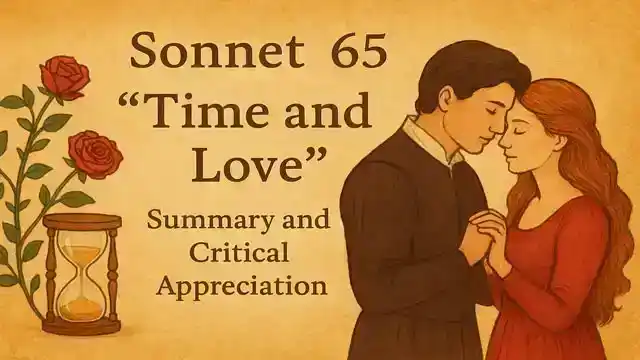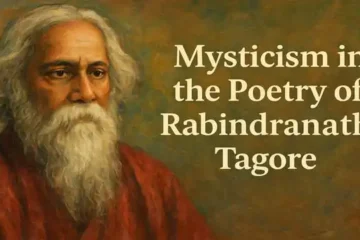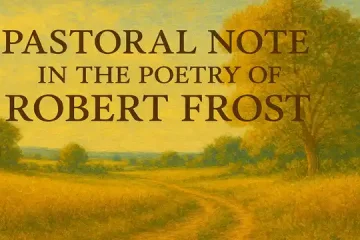Introduction to Sonnet 65 “Time and Love”:
Shakespeare’s Sonnet 65, often titled “Time and Love,” is one of his finest reflections on the power of time and the endurance of true love. In his sonnets, Shakespeare frequently highlights the divine quality of genuine love—its ability to transcend mortality and resist the forces of decay.
In this poem “Time and Love,” he compares love with various elements of the material world—brass, stone, earth, and the vast sea—emphasising that, no matter how strong or enduring they seem, all are subject to destruction over time. Beauty fades, summer yields to winter, rocks crumble, and iron gates rust. Even the greatest among humankind cannot escape death. This realization saddens the poet, as he fears that his beloved will also be claimed by time’s relentless power.
Yet, amidst this despair, Shakespeare finds hope in poetry. He believes that while all else may perish, his verse has the power to preserve his friend’s beauty and spirit. Written in “black ink,” his words shine with the light of immortal love, ensuring that the memory of the beloved will live on forever.
Summary of the Sonnet “Time and Love”:
Power of Mortality:
Pointing out the power of mortality, the poet claims that all things are subject to decay. Time destroy all later or sooner. We think the pots made of brass are very strong for they do not get rusted or heavy walls of stone made in a fort are very strong for even forceful armies could not break them, the world so wide is established on the earth, naturally it comes to mind that the earth is solid and the boundless sea that can overwhelm the world seems to be the mightiest, but these are not beyond the power of decay. It makes the poet sad to think of tragic fate of beauty that is tender like a flower and cannot make a good defence. He concludes that beauty too is subject to decay. It is therefore, mortality is called sad for it does not make anybody happy.
Destructive Power of Time:
Destructive powers of time do not spare anything whether good or bad. Everybody likes the cool breeze of summer but it fails to resist the attack of cold waves and gusts. Even unconquerable rocks and strong heavy gates of steel are subject to decay. Whatever exists in this world is mortal. This thought makes the poet sad. He loves so many fair things and fears that they all shall be destroyed by time.
Fear of Mortality:
Whenever the poet thinks about the destructive power of time his heart is filled with fear . It comes to his mind that whatever he loves will decay. These destructive powers have no consideration of good or bad. They do not spare even the best of mankind. None can escape the snares of death. Time is like a swift flying bird and none can stop its flight. It does not spare even the beautiful. The poet fears that, thus, his friend too will fall a prey to destructive powers of mortality.
Hope through Poetry and Love:
The poet refers to the magic of poetry. If he composes a poem on his friend, he will become immortal for death can destroy body but not the name. There is one more magic to work here that is his true love for the friend. Love is immortal. True love expressed even in black ink shines bright. The poet hopes that his friend will always be remembered for he has mentioned his true love for the friend in his poems.
Critical Appreciation of the Sonnet 65 “Time and Love”:
Introduction:
Sonnet 65“Time And Love” is one of the most popular sonnets by Shakespeare. According to some scholars, this sonnet is a sort of introduction to the next sonnet, True Love….. In fact the both are sister sonnets for they deal with the immortality of love.
Great Ideas:
“Time And Love” is a sonnet of great ideas. It brings to light the basic truths of human life and world. Generally, we enjoy ourselves under the illusion that whatever we like and love is permanent and we shall never be deprived of that while, in fact, all is subject to decay. We ought to be aware of the fact that everybody who is born must die in spite of his beauty or greatness. The poem points out difference between appearance and reality also. For example the things of brass, stone, and steel seem strong enough to be permanent while in reality they are subject to decay.
“Since brass, nor stone, nor earth, nor boundless sea.
But sad mortality o’er sways their power.
When rocks impregnable are not so stout.
Nor gates of steel so strong, but time decays?”
The poem “Time And Love” warns against vain pride of beauty for it too is subject to resist the fury of mortality.
“Who his spoil of beauty can forbid?”
Likewise be attracts attention to this tragic reality that even the best of mankind have suffered death for it spares none.
“Shall Time’s best jewel from Time’s chest lie hid?”
The poet concludes the sonnet pointing out the strong magic of poetry and true love that these two are beyond the power of decay. Whatever is written in a poem becomes permanent. Whenever a man loves truly he attains spiritual heights. His love does not depend on body. He believes in unification of souls which are immortal. Therefore true love is beyond mortality.
“O! none unless this miracle have night.
That in black ink my love may still shine bright.”
Strong Emotions:
The poet expresses strong emotions of sorrow when he points out supremacy of mortality.
“Since brass, nor stone, nor earth, nor boundless sea,
But sad mortality o’ersways their power,
How with this rage shall beauty hold a plea,
Whose action is no stronger than a flower?
O how shall summer’s honey breath hold out
Against the wreckful siege of battering days,
When rocks impregnable are not so stout
Nor gates of steel so strong, but time decays?”
He stresses it by telling about the tragic end of even the best of mankind.
“O fearful meditation! where, alack!
Shall Time’s best jewel from Time’s chest lie hid?
Or what strong hand can hold his swift foot back,
Or who his spoil of beauty can forbid?”
Strong emotions of true love are expressed in the concluding couplet.
“O! none, unless this miracle have might,
That in black ink my love may still shine bright.”
High Imagination:
Shakespeare’s high imagination is well exposed in this poem “Time And Love”. He imagines that great men are like. Time’s best jewel and the grave is Time’s chest. He imagines that time is a fast flying bird which cannot be stopped by any power.
“O fearful meditation! where, alack!
Shall time’s best jewel from Time’s chest lie hid?
Or what strong hand can hold his swift foot back,
Or who his spoil of beauty can forbid?”
Sensuous Word Pictures:
Shakespeare impresses with his sensuous art that helps in drawing lively word – pictures. For example, the following lines are highly sensuous:
“Since brass, nor stone, nor earth, nor boundless sea,
But sad mortality o’ersways their power,
How with this rage shall beauty hold a plea,
Whose action is no stronger than a flower?
O how shall summer’s honey breath hold out
Against the wreckful siege of battering days,
When rocks impregnable are not so stout
Nor gates of steel so strong, but time decays?”
Here, the poet employs the senses of sight, touch, smell and taste in these lines. The whole picture presents a scene of summer in the second stanza which reminds of a warm touch while honey employs senses of taste and smell.
Figurative Language:
Shakespeare has composed the poem “Time And Love” in a simple but impressive language. He uses symbol, imagery and myth in the following line.
“Or what strong hand can hold his swift foot back.”
Here swift speed is symbol of time, swift foot suggest a bird or animal imagery and a myth is made that time is running fast but no power can hold it back. The last lines of the poem present a paradox.
“O! none, unless this miracle have might,
That in black ink my love may still shine bright.”
Conclusion: A Shakespearean Sonnet:
Thus “Time And Love” is an ideal Shakespearean sonnet that follows the English pattern of three stanzas of four lines each, followed by a rhyming couplet. The sonnet has the following rhyme scheme: ab ab, cd cd, ef ef, gg.




